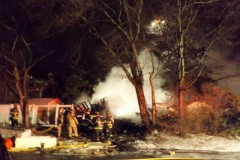Ocean County’s state legislators have proposed a bill that would require homes to have explosive gas sensors installed. The proposal comes after two explosions leveled homes in Point Pleasant Beach and Stafford Township over the past few weeks.
According to the joint statement by state Sen. James Holzapfel, and Assemblymen Dave Wolfe and Greg McGuckin (all R-Ocean), explosive gas sensors alert residents to the presence of dangerous quantities of methane or propane gas in the air. Methane is the primary component of natural gas used to fuel many furnaces, hot water heaters, fireplaces, stoves and ovens.
The units look like smoke detectors and carbon monoxide detectors. Combination units that detect both carbon monoxide and explosive gases can be purchased for about $40, the legislators said.
|
|
Under the proposed law, a new requirement for the use of explosive gas detectors would mirror similar existing requirements for carbon monoxide detectors. The legislation allows for the use of a single device that can detect both carbon monoxide and explosive gases to satisfy both requirements. The legislation requires single and two family homes to be inspected for the presence of an explosive gas sensor prior to the issuance of a certificate of occupancy. There would be no need to install a gas detector if it has been determined that no potential explosive gas risk exists. Likewise, every unit in a hotel or multiple dwelling would be required to have explosive gas detectors installed.

A home in Point Pleasant Beach following a March 2, 2015 gas explosion. (Photo: Barnegat Bay Island/ Facebook)
“Affordable explosive gas sensors are now widely available at most home improvement stores,” said Wolfe. “We’d like to see them in every home alongside smoke and carbon monoxide detectors.”
McGuckin said the widespread use of gas sensors would alert residents to problems that need to be fixed before they result in dangerous explosions like those seen recently.
“While the use of natural gas and propane for heating and cooking in our homes is extremely safe, the recent house explosions in Pt. Pleasant Beach and Stafford Township have reminded us that gas leaks do pose some risk,” said Holzapfel. “We can lower the risk of gas leaks by modeling our response on the successful rollout of carbon monoxide detectors that are now present in nearly every home.”













